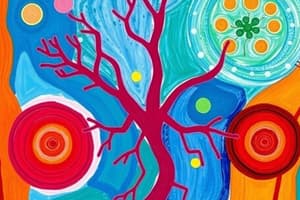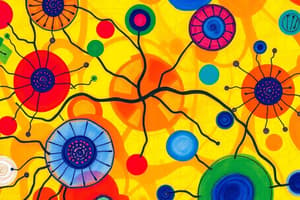Podcast
Questions and Answers
What happens to the energy of a bouncing ball after impact with the ground?
What happens to the energy of a bouncing ball after impact with the ground?
- It is completely transformed into sound energy.
- It is conserved and remains in the ball.
- Some energy is transformed into thermal energy, and some is retained as kinetic energy. (correct)
- All energy is lost as light energy.
In terms of energy efficiency, which factor most affects the height a ball bounces?
In terms of energy efficiency, which factor most affects the height a ball bounces?
- The color of the ball.
- The material of the surface it bounces on. (correct)
- The time it takes to bounce.
- The temperature of the ball.
Which energy transformation occurs when electricity generates heat in a toaster?
Which energy transformation occurs when electricity generates heat in a toaster?
- Electrical energy is transformed into mechanical energy.
- Electrical energy is transformed into electromagnetic energy.
- Electrical energy is transformed into thermal energy. (correct)
- Electrical energy is transformed into potential energy.
When analyzing trends in energy efficiency, what is an important method of data processing?
When analyzing trends in energy efficiency, what is an important method of data processing?
Which of the following best describes a plausible solution to improve energy efficiency in machines?
Which of the following best describes a plausible solution to improve energy efficiency in machines?
Which organ is NOT part of the digestive system?
Which organ is NOT part of the digestive system?
What is one of the functions of the circulatory system?
What is one of the functions of the circulatory system?
Which technology is commonly used for organ transplantation?
Which technology is commonly used for organ transplantation?
Which major organ is NOT part of the excretory system?
Which major organ is NOT part of the excretory system?
What role do skeletal muscles primarily serve?
What role do skeletal muscles primarily serve?
Which of the following processes leads to physical weathering?
Which of the following processes leads to physical weathering?
What is the primary agent of erosion that shapes many landforms?
What is the primary agent of erosion that shapes many landforms?
Which layer of the Earth is primarily composed of molten rock?
Which layer of the Earth is primarily composed of molten rock?
What process primarily shapes landforms through the breakdown and transportation of materials?
What process primarily shapes landforms through the breakdown and transportation of materials?
Which type of rock is formed from the cooling and solidification of magma or lava?
Which type of rock is formed from the cooling and solidification of magma or lava?
What is a key characteristic of renewable resources?
What is a key characteristic of renewable resources?
How do Aboriginal and Torres Strait Islander peoples contribute to resource management?
How do Aboriginal and Torres Strait Islander peoples contribute to resource management?
What is the primary focus of studying fossils in geology?
What is the primary focus of studying fossils in geology?
Which of the following best describes energy transformations?
Which of the following best describes energy transformations?
What impact does mining have on society and the environment?
What impact does mining have on society and the environment?
Which statement about sedimentary rocks is correct?
Which statement about sedimentary rocks is correct?
Flashcards are hidden until you start studying
Study Notes
Year 8 Science Yearly Exam
- This exam accounts for 35% of your overall grade.
- The exam is divided into two sections: Multiple choice questions (20 marks) and Written response questions (25 marks).
- You will have 3 minutes to read and 50 minutes to complete the exam.
Exam Content
-
Living Systems
- Digestive System: Identify major organs and their role in the digestive system.
- Circulatory System: Identify major organs and their role in the circulatory system.
- Excretory System: Identify major organs and their role in the excretory system.
- Skeletal/ Muscular System: Identify major organs and their role in the skeletal/ muscular system.
- Respiratory System: Identify major organs and their role in the respiratory system.
- Reproductive System: Identify major organs and their role in the reproductive system.
-
Earth's Crust
- Earth Layers: Describe the structure of the Earth.
- Types of Weathering: Describe physical and chemical weathering.
- Agents of Erosion: Describe the agents of erosion.
- Identifying Minerals: Define minerals.
- Types of Rocks and the Rock Cycle
- Describe sedimentary, igneous, and metamorphic rocks with examples.
- Explain how they relate to the rock cycle.
- Natural and Man-Made Resources: Investigate the use of these resources in everyday life.
- Renewable and Non-renewable Resources: Investigate renewable and non-renewable resources and their impacts on society and the environment.
- Extraction of an Ore: Explain the importance of mining for employment.
- Fossil and Geological History: Explain the importance of fossils in understanding geological history.
-
Energy Transformation
- Types of Energy: Define different types of energy and describe everyday energy transformations.
- Energy Transformation and Energy Flow: Construct and discuss energy flow and transformation diagrams.
- Electricity as Energy Transfer: Outline the energy transformation in the generation of electricity.
Skills Assessed
- Identifying questions and problems that can be tested or researched and makes predictions based on scientific knowledge.
- Producing a plan for investigations collaboratively and individually.
- Processing and analyzing data from investigations and secondary sources to identify trends, patterns and relationships, and draw conclusions.
- Selecting and using appropriate strategies to produce creative and plausible solutions for identified problems.
- Presenting science ideas, findings and information using appropriate scientific language, text types and representations.
Important Notes
- You must attend all timetabled lessons or scheduled school activities on the school day before the exam.
- If you are absent for a valid reason, consult the assessment handbook for information about illness and misadventure.
- Lack of approved proof of illness or leave may lead to a reduced assessment mark for the exam.
Studying That Suits You
Use AI to generate personalized quizzes and flashcards to suit your learning preferences.




